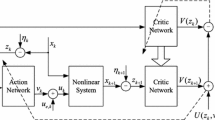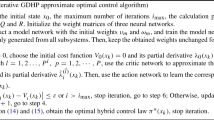Abstract
In this paper, a new dual iterative adaptive dynamic programming (ADP) algorithm is developed to solve optimal control problems for a class of nonlinear systems with time-delays in state and control variables. The idea is to use the dynamic programming theory to solve the expressions of the optimal performance index function and control. Then, the dual iterative ADP algorithm is introduced to obtain the optimal solutions iteratively, where in each iteration, the performance index function and the system states are both updated. Convergence analysis is presented to prove the performance index function to reach the optimum by the proposed method. Neural networks are used to approximate the performance index function and compute the optimal control policy, respectively, for facilitating the implementation of the dual iterative ADP algorithm. Simulation examples are given to demonstrate the validity of the proposed optimal control scheme.









Similar content being viewed by others
References
Abu-Khalaf M, Lewis FL (2005) Nearly optimal control laws for nonlinear systems with saturating actuators using a neural network HJB approach. Automatica 41(5):779–791
Al-Tamimi A, Abu-Khalaf M, Lewis FL (2007) Adaptive critic designs for discrete-time zero-sum games with application to \(H_{\infty}\) control. IEEE Trans Syst Cybern Part B Cybern 37(1):240–247
Al-Tamimi A, Lewis FL, Abu-Khalaf M (2008) Discrete-time nonlinear HJB solution using approximate dynamic programming: convergence proof. IEEE Trans Syst Man Cybern Part B Cybern 38(4):943–949
Basin M, Rodriguez-Gonzalez J (2006) Optimal control for linear systems with multiple time delays in control input. IEEE Trans Autom Control 51(1):91–97
Basin M, Rodriguez-Gonzaleza J, Fridman L (2007) Optimal and robust control for linear state-delay systems. J Franklin Inst 344(7):830–845
Bellman RE (1957) Dynamic programming. Princeton University Press, Princeton, NJ
Busoniu L, Ernst D, Schutter BD, Babuska R (2010) Approximate dynamic programming with a fuzzy parameterization. Automatica 46(5):804–814
Gao H, Sun W, Shi P (2010) Robust sampled-data \(H_{\infty}\) control for vehicle active suspension systems. IEEE Trans Control Syst Technol 18(1):238–245
Chen Z, Jagannathan S (2008) Generalized Hamilton-Jacobi-Bellman formulation-based neural network control of affine nonlinear discretetime systems. IEEE Trans Neural Netw 19(1):90–106
Chiasson J (2007) Applications of time delay systems. Springer, Berlin
Halpin SM, Harley KA, Jones RA, Taylor LY (2008) Slope-permissive under-voltage load shed relay for delayed voltage recovery mitigation. IEEE Trans Power Syst 23(3):1211–1216
Han M, Han B, Xi J, Hirasawa K (2006) Universal learning network and its application for nonlinear system with long time delay. Comput Chem Eng 31(1):13–20
Hanselmann T, Noakes L, Zaknich A (2007) Continuous-time adaptive critics. IEEE Trans Neural Netw 18(3):631–647
Ho DWC, Li J, Niu Y (2005) Adaptive neural control for a class of nonlinearly parametric time-delay systems. IEEE Trans Neural Netw 16(3):625–635
Huang X, Ma M (2008) Optimal scheduling for minimum delay in passive star coupled WDM optical networks. IEEE Trans Commun 56(8):1324–1330
Lewis FL, Vrabie D (2009) Reinforcement learning and adaptive dynamic programming for feedback control. IEEE Circuits Syst Mag 9(3):32–50
Li T, Tong SC, Feng G (2010) A novel robust adaptive-fuzzy-tracking control for a class of nonlinear multi-input/multi-output systems. IEEE Trans Fuzzy Syst 18(1):150–160
Li T, Wang D, Feng G, Tong SC (2010) A DSC approach to robust adaptive NN tracking control for strict-feedback nonlinear systems. IEEE Trans Syst Man Cybern Part B Cybern 40(3):915–927
Li T, Feng , Wang D, Tong S (2010) Neural-network-based simple adaptive control of uncertain multi-input multi-output non-linear systems. IET Control Theory Appl 4(9):1543–1557
Liu D, Zhang Y, Zhang H (2005) A self-learning call admission control scheme for CDMA cellular networks. IEEE Trans Neural Netw 16(5):1219–1228
Malek-Zavarei M, Jashmidi M (1987) Time-delay systems: analysis, optimization and applications. North-Holland, Amsterdam
Pindyck RS (1992) The distrete-time tracking problem with a time delay in the control. IEEE Trans Autom Control 17(6):397–398
Murray JJ, Cox CJ, Lendaris GG, Saeks R (2002) Adaptive dynamic programming. IEEE Trans Syst Man Cybern Part C Appl Rev 32(2):140–153
Prokhorov DV, Wunsch DC (1997) Adaptive critic designs. IEEE Trans Neural Netw 8(5):997–1007
Richard JP (2003) Time-delay systems: an overview of some recent advances and open problems. Automatica 39(10):1667–1694
Schenato L (2008) Optimal estimation in networked control systems subject to random delay and packet drop. IEEE Trans Autom Control 53(5):1311–1317
Si J, Wang YT (2001) On-line learning control by association and reinforcement. IEEE Trans Neural Netw 12(2):264–276
Silva GJ (2005) PID Controllers for time-delay systems. Birkhuser, Boston, MA
Song R, Zhang H, Luo Y, Wei Q (2010) Optimal control laws for time-delay systems with saturating actuators based on heuristic dynamic programming. Neurocomputing 73(16–18):3020–3027
Sun Q, Li Z, Yang J, Luo Y (2010) Load distribution model and voltage static profile of Smart Grid. J Central S Univ Technol 17(4):824–829
Vamvoudakis KG, Lewis FL (2010) Online actor-critic algorithm to solve the continuous-time infinite horizon optimal control problem. Automatica 46(5):878–888
Wang D, Liu D, Wei Q (2012) Finite-horizon neuro-optimal tracking control for a class of discrete-time nonlinear systems using adaptive dynamic programming approach. Neurocomputing 78(1):14–22
Wang FY, Jin N, Liu D, Wei Q (2011) Adaptive dynamic programming for finite-horizon optimal control of discrete-time nonlinear systems with \(\epsilon\)-error bound. IEEE Trans Neural Netw 22(1):24–36
Wang FY, Zhang H, Liu D (2009) Adaptive dynamic programming: an introduction. IEEE Comput Intell Mag 4(2):39–47
Watkins C (1989) Learning from delayed rewards. Ph.D. Thesis. Cambridge University, Cambridge
Wei Q, Zhang H, Dai J (2009) Model-free multiobjective approximate dynamic programming for discrete-time nonlinear systems with general performance index functions. Neurocomputing 72(7–9):1839–1848
Werbos PJ (1991) A menu of designs for reinforcement learning over time. In: Miller WT, Sutton RS, Werbos PJ (eds) Neural networks for control. MIT Press, Cambridge, pp 67–95
Werbos PJ (1992) Approximate dynamic programming for real-time control and neural modeling. In: White DA, Sofge DA (eds) Handbook of intelligent control: neural, fuzzy, and adaptive approaches ch. 13.. Van Nostrand Reinhold, New York
Widrow B, Gupta N, Maitra S (1973) Punish/reward: learning with a critic in adaptive threshold systems. IEEE Trans Syst Man Cybern 3:455–465
Yadav V, Padhi R, Balakrishnan SN (2007) Robust/optimal temperature profile control of a high-speed aerospace vehicle using neural networks. IEEE Trans Neural Netw 18(4):1115–1128
Yang Y, Feng G, Ren J (2004) A combined backstepping and small-gain approach to robust adaptive fuzzy control for strict-feedback nonlinear systems. IEEE Trans Syst Man Cybern Part A Syst Humans 34(3):406–420
Zhang H, Basin MV, Skliar M (2007) It\(\hat{o}\)-Volterra optimal state estimation with continuous, multirate, randomly sampled, and delayed measurements. IEEE Trans Autom Control 52(3):401–416
Zhang H, Quan Y (2001) Modeling, identification and control of a class of nonlinear system. IEEE Trans Fuzzy Syst 9(2):349–354
Zhang H, Wang Y, Liu D (2008) Delay-dependent guaranteed cost control for uncertain stochastic fuzzy systems with multiple time delays. IEEE Trans Syst Man Cybern Part B Cybern 38(1):125–140
Zhang H, Wei Q, Luo Y (2008) A novel infinite-time optimal tracking control scheme for a class of discrete-time nonlinear systems via the greedy HDP iteration algorithm. IEEE Trans Syst Man Cybern Part B Cybern 38(4):937–942
Zhang H, Wei Q, Liu D (2011) An iterative adaptive dynamic programming method for solving a class of nonlinear zero-sum differential games. Automatica 47(1):207–214
Zhang H, Song R, Wei Q, Zhang T (2011) Optimal tracking control for a class of nonlinear discrete-time systems with time delays based on heuristic dynamic programming. IEEE Trans Neural Netw 22(12):1851–1862
Zhang H, Yang D, Chai T (2007) Guaranteed cost networked control for T-S fuzzy systems with time delay. IEEE Trans Syst Man Cybern Part C Appl Rev 37(2):160–172
Acknowledgments
This work was supported in part by the National Natural Science Foundation of China under Grants 60904037, 60921061, and 61034002, in part by Beijing Natural Science Foundation under Grant 4102061, and in part by China Postdoctoral Science Foundation under Grant 201104162.
Author information
Authors and Affiliations
Corresponding author
Rights and permissions
About this article
Cite this article
Wei, Q., Wang, D. & Zhang, D. Dual iterative adaptive dynamic programming for a class of discrete-time nonlinear systems with time-delays. Neural Comput & Applic 23, 1851–1863 (2013). https://doi.org/10.1007/s00521-012-1188-7
Received:
Accepted:
Published:
Issue Date:
DOI: https://doi.org/10.1007/s00521-012-1188-7




